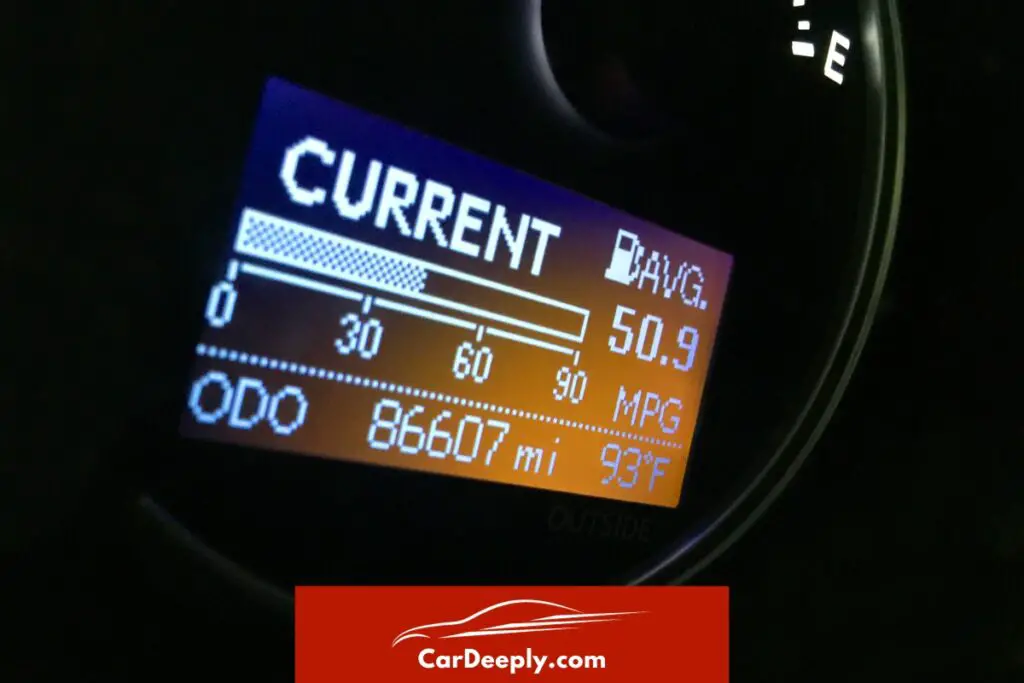Hi, welcome to the bundle of information about EcoBoost MPG!
With years of automotive expertise, we’ve dug deep into the real-world performance, engine options, and even the impact of drivetrain features on fuel efficiency. Here’s a sneak peek into what’s in store:
- Uncover the unique features that set the F-150 EcoBoost engine apart.
- Real-world MPG tests that debunk common myths.
- Practical tips to immediately improve your F-150’s fuel efficiency.
So, are you ready to unlock the secrets to maximizing your F-150 EcoBoost MPG? If yes, keep reading!
Advertising links are marked with *. We receive a small commission on sales, nothing changes for you.
Key Takeaways

- The F-150 EcoBoost engine employs turbocharging and direct fuel injection for optimal fuel efficiency.
- Real-world testing reveals that the F-150 EcoBoost often falls short of official MPG estimates.
- Different EcoBoost engine options offer varying levels of fuel efficiency, making it crucial to choose based on your needs.
- Drivetrain options and the Auto Start/Stop feature can significantly impact your F-150’s fuel economy.
- Practical tips like regular maintenance and using the right driving mode can help you maximize your F-150 EcoBoost MPG.
Understanding the F-150 EcoBoost Engine
When it comes to the F-150 EcoBoost engine, there’s more than meets the eye. This isn’t your run-of-the-mill powertrain; it’s engineered for performance and efficiency. Let’s delve into what sets it apart.
What Makes the EcoBoost Engine Special?
The EcoBoost engine is a marvel of automotive engineering, designed to offer a blend of power and fuel economy. It employs turbocharging and direct fuel injection to maximize performance while minimizing waste.
Key Features:
- Turbocharging: Unlike traditional engines, the EcoBoost uses a turbocharger to force more air into the combustion chamber. This results in increased horsepower without sacrificing fuel efficiency.
- Direct Fuel Injection: This feature allows precise control over the fuel-air mixture, enhancing combustion efficiency.
- Variable Valve Timing: Adjusts the timing of opening and closing of valves to ensure optimal combustion, further improving MPG ratings.
Practical Guidance:
- Check Turbocharger Regularly: A malfunctioning turbocharger can significantly affect your F-150’s fuel economy. Make it a habit to inspect it during routine maintenance.
- Monitor Fuel Quality: Using low-quality fuel can hamper the direct injection system. Stick to reputable fuel stations and consider using a fuel additive designed for direct injection engines.
By understanding these features, you sidestep the common mistake of overlooking what contributes to the F-150 EcoBoost’s fuel efficiency.
Real-World MPG Testing
Reading about MPG ratings is one thing, but how does the F-150 EcoBoost perform under real-world conditions? The Daily Motor’s testing revealed some eye-opening facts.
Key Findings:
- Highway MPG: The F-150 EcoBoost scored an average of 22 MPG on the highway, slightly lower than the EPA estimates.
- City MPG: The truck managed around 18 MPG in city conditions, again falling short of official figures.
Practical Tips:
- Drive Smoothly: Rapid acceleration and braking can drastically reduce your MPG. Aim for smooth transitions between speeds.
- Limit Idling: Excessive idling can consume up to a gallon of fuel per hour. Turn off the engine if you expect to be stationary for over a minute.
By following these tips, you’re not just reading about fuel economy but actively improving it.
Comparing F-150 EcoBoost Engine Options
Ford offers a variety of EcoBoost engines, each with its own set of MPG ratings. My KW Ford provides a comprehensive list, and here are some standout options:
- 2.7L V6 EcoBoost: This engine offers 20 MPG in the city and 26 MPG on the highway.
- 3.5L V6 EcoBoost: A more powerful option but comes with a slight dip in fuel economy, offering 18 MPG in the city and 25 MPG on the highway.
Practical Guidance:
- Know Your Needs: If you primarily drive in the city, the 2.7L V6 might better fit you. For those who need more power for towing, the 3.5L V6 could be the better option.
You maximize performance and fuel efficiency by choosing the right engine for your specific needs.
Impact of Drivetrain and Auto Start/Stop on MPG
Let’s shift gears and explore how drivetrain options and the Auto Start/Stop feature influence the F-150 EcoBoost’s fuel economy. Tom Wood Ford provides some valuable insights on this topic.
Drivetrain’s Role in Fuel Efficiency
The type of drivetrain you choose can significantly affect your truck’s MPG. Ford offers both 2WD and 4WD options for the F-150 EcoBoost.
Key Data Points:
- 2WD: Generally offers better fuel economy, with an average of 22 MPG on the highway.
- 4WD: While it provides better traction, it comes at the cost of fuel efficiency, averaging around 20 MPG on the highway.
Actionable Steps:
- Evaluate Your Driving Conditions: If you mainly drive on well-paved roads, 2WD could be more fuel-efficient.
- Check Tire Pressure: Especially in 4WD, maintaining optimal tire pressure can help mitigate the loss in fuel efficiency.
The Auto Start/Stop Feature
This feature automatically turns off the engine when the vehicle comes to a stop and restarts it when you’re ready to move. It’s designed to save fuel, but does it?
Key Insights:
- Fuel Savings: Auto Start/Stop can save approximately 0.2 gallons of fuel per hour. If you want to get better fuel mileage in your F-150, there are ways to do it!
- Longevity: Some users worry about wear and tear, but modern systems are designed to handle frequent starts and stops.
Practical Tips:
- Enable the Feature: Ensure Auto Start/Stop is enabled in your vehicle settings.
- Monitor Engine Health: Monitor your engine’s performance to ensure the feature is not causing undue stress.
By understanding these aspects, you’re well on becoming an F-150 EcoBoost MPG guru.
Practical Tips to Improve Your F-150 EcoBoost MPG
You’ve got the knowledge; now let’s put it into practice. Here are some actionable tips to get the most out of your F-150’s fuel efficiency.
- Regular Maintenance: A well-maintained engine is a fuel-efficient engine. Schedule regular check-ups to keep everything running smoothly.
- Use Cruise Control: On long highway drives, cruise control can help maintain a constant speed, improving fuel economy.
- Limit Heavy Loads: Excessive weight can strain the engine, reducing MPG. Only carry what you need.
Practical Guidance:
- Plan Your Trips: Combine short errands into one trip to minimize fuel consumption.
- Check Air Filters: A clogged air filter can reduce fuel efficiency by up to 10%.
By implementing these tips, you’re not just reading about improving fuel efficiency—you’re doing it.
Conclusion
You’ve journeyed through the intricacies of F-150 EcoBoost MPG—from understanding the engine’s unique features to real-world testing and practical tips. Armed with this knowledge, you can make informed decisions and get the most out of your F-150 EcoBoost.
Frequently Asked Questions
How Does Towing Capacity Affect F-150 EcoBoost MPG?
Towing can significantly impact your F-150 EcoBoost’s fuel efficiency. The added weight and resistance make the engine work harder, leading to a decrease in MPG. Knowing your truck’s towing capacity and how it correlates with fuel economy is crucial. Ensure you’re within the recommended towing limits to maintain optimal fuel efficiency.
Can Software Updates Improve My F-150’s Fuel Economy?
Yes, Ford software updates can sometimes include engine performance and fuel efficiency optimizations. Keeping your F-150’s software up-to-date is a practical tip to ensure you get the most out of your EcoBoost engine.
How Does Weather Affect My F-150 EcoBoost MPG?
Extreme weather conditions, particularly cold temperatures, can adversely affect your F-150’s fuel economy. Cold weather can increase friction and make the engine work harder, reducing MPG. It’s advisable to keep your truck in a garage during extreme weather conditions to mitigate this effect.
Is It Worth Investing in Premium Fuel for Better MPG?
While the F-150 EcoBoost engine is designed to run efficiently on regular fuel, some drivers claim that premium fuel slightly improves MPG. However, the cost difference may outweigh the benefits, so it’s essential to weigh your options carefully.
How Do Driving Modes Affect Fuel Efficiency?
The F-150 EcoBoost has various driving modes like Eco, Sport, and Tow/Haul. Each mode adjusts the truck’s performance parameters, including fuel efficiency. Using the Eco mode can help maximize your MPG, while other modes like Sport will prioritize performance over fuel economy.

Luna Meschiari is a full-blooded car nut who is well known to local garages, as each article is meticulously researched and peppered with the latest piece of information. Guess what car she’s driving right now? A RAV4 2021 Hybrid. But her heart also sleeps for pickups like the F-150. Get to know Luna better on the about us page.
Advertising links are marked with *. We receive a small commission on sales, nothing changes for you.

